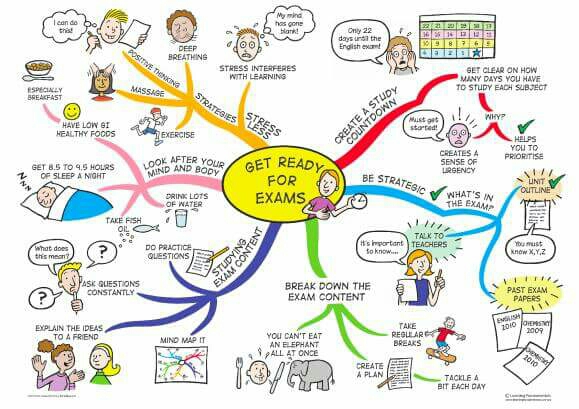Maximizing Your Study Time: Tips for Efficient Learning
In an increasingly competitive academic landscape, students face the daunting challenge of mastering vast amounts of information in limited time. With distractions at every turn and an ever-expanding syllabus, effective study strategies are essential. This comprehensive guide offers insights and practical tips to help you maximize your study time, enhance retention, and improve your overall academic performance.
1. Understanding the Importance of Efficient Study Techniques
Efficient study techniques are not merely about spending hours with textbooks; they are about maximizing the value of the time you invest in learning. The brain’s ability to process and retain information can be enhanced through effective methods that cater to how we learn best.
The Science of Learning
Cognitive science reveals that our brains are wired to learn through connections and associations. Understanding how information is organized and interconnected can help us remember it better. Efficient study techniques leverage these cognitive principles to enhance learning, such as:
- Chunking: Breaking down information into smaller, manageable parts helps your brain process and remember data more easily.
- Spaced Repetition: Spacing out study sessions over time improves retention compared to cramming, allowing your brain to consolidate information.
By employing efficient study techniques, students can significantly reduce study time while improving comprehension and recall.
2. Creating the Ideal Study Environment
The environment in which you study plays a crucial role in your ability to concentrate and absorb information. An ideal study environment is quiet, organized, and free from distractions.
Key Elements of a Productive Study Space
- Minimize Distractions: Choose a location that is quiet and minimizes interruptions. This could be a library, a dedicated study room, or a quiet café.
- Organize Your Materials: Keep your study area tidy. Having all necessary materials—books, notes, stationery—within reach prevents unnecessary distractions.
- Comfort Matters: Ensure your study space is comfortable but not too cozy. A supportive chair and good lighting can make a big difference in your focus and stamina.
- Personalize Your Space: Adding personal touches like motivational quotes or plants can make your study environment more inviting and inspiring.
The Role of Ambiance
Consider the ambiance of your study area. Background music can either enhance concentration or become a distraction. Experiment with different sounds—some students find classical music helpful, while others prefer silence.
3. Setting Specific Study Goals
Setting specific, achievable study goals helps maintain focus and motivation throughout your study sessions. Goals provide a clear direction and a sense of accomplishment as you complete them.
Crafting Effective Goals
- Be Specific: Instead of vague goals like “study for math,” opt for precise objectives like “complete Chapter 4 exercises and review key concepts.”
- Set a Timeline: Establish deadlines for each goal to create a sense of urgency. This helps in preventing procrastination and keeps you accountable.
- Use the SMART Criteria: Your goals should be Specific, Measurable, Achievable, Relevant, and Time-bound. For example, “I will complete three chapters of my biology textbook by the end of the week.”
Breaking Down Large Tasks
For larger projects, break down goals into smaller, manageable tasks. This not only makes the workload less overwhelming but also provides multiple opportunities for achievement, boosting motivation.
4. Employing Active Learning Techniques
Active learning is an instructional approach that engages students in the learning process actively, rather than passively consuming information. It has been shown to significantly improve retention and understanding.
Techniques for Active Learning
- Summarization: After reading a chapter or section, summarize the key points in your own words. This reinforces your understanding and helps with retention.
- Teaching Others: Explaining concepts to a peer or even to yourself can clarify your understanding and highlight areas that need further review.
- Practice Problems: Especially for subjects like math and science, solving practice problems allows you to apply concepts and see how they work in practice.
- Mind Mapping: Create visual representations of information using mind maps to see connections between ideas and concepts. This is particularly useful for subjects with complex relationships.
Engaging Multiple Senses
Utilize various senses while studying. For instance, read aloud, use diagrams, or even create flashcards. Engaging multiple senses can enhance memory retention.
5. Utilizing Time Management Strategies
Time management is crucial for maximizing your study time. Without effective time management, it is easy to feel overwhelmed by the volume of material you need to cover.
Time Management Techniques
- The Pomodoro Technique: This technique involves studying for 25 minutes, followed by a 5-minute break. After completing four sessions, take a longer break of 15-30 minutes. This method helps maintain focus and reduces burnout.
- Prioritize Tasks: Use a priority matrix to categorize tasks based on their urgency and importance. Focus on high-priority tasks first to make the most significant impact on your studies.
- Create a Study Schedule: Develop a weekly study schedule that outlines when you will study each subject. Be sure to stick to this schedule as closely as possible to develop a routine.
Flexibility is Key
While it’s essential to have a structured plan, flexibility is also crucial. Life can be unpredictable, and your study schedule may need adjustments. Adapt and reassess your goals as necessary to stay on track.
6. Incorporating Breaks and Downtime
It may seem counterintuitive, but taking regular breaks can actually improve your focus and productivity. Studying for long periods without rest can lead to fatigue and decreased effectiveness.
Benefits of Taking Breaks
- Mental Refresh: Breaks give your brain a chance to rest and recharge, helping you return to your studies with renewed focus.
- Improved Retention: Short breaks can facilitate better retention of information as your brain processes what you’ve learned.
- Enhanced Creativity: Stepping away from your studies can lead to new insights and creative solutions to problems.
Effective Break Strategies
- Short Breaks: Take 5-10 minute breaks every hour to stretch, hydrate, or step outside for fresh air.
- Longer Breaks: After completing significant study tasks, take longer breaks (15-30 minutes) to relax and recharge.
- Physical Activity: Engage in light physical activity during breaks, such as walking or stretching, to boost your mood and energy levels.
7. Reviewing and Reflecting on Your Learning
Regular review and reflection are vital for consolidating knowledge and enhancing retention. Incorporating review sessions into your study routine can significantly improve your mastery of subjects.
Effective Review Techniques
- Daily Reviews: Spend a few minutes at the end of each day reviewing what you’ve learned. This helps reinforce new information and identify areas that may need more attention.
- Weekly Summaries: Create summaries of the week’s content and assess your understanding. This can also help you prepare for upcoming exams.
- Self-Testing: Use quizzes, flashcards, or practice exams to test your knowledge. This active recall strengthens memory and identifies areas needing improvement.
Reflecting on Learning
Take time to reflect on your learning process. Ask yourself questions like:
- What strategies worked well for me?
- Which areas do I find most challenging?
- How can I adjust my study habits to improve?
Reflection not only enhances self-awareness but also encourages a growth mindset.
8. Leveraging Technology for Study Efficiency
Technology can be a powerful tool for enhancing your study experience. With the right apps and resources, you can streamline your study process and make learning more engaging.
Recommended Study Tools
- Study Apps: Consider apps like Anki for flashcards, Forest for focused study sessions, or Quizlet for interactive learning.
- Online Resources: Utilize online lectures, tutorials, and forums for additional support. Websites like Khan Academy, Coursera, and edX offer a wealth of information across various subjects.
- Digital Organization: Use tools like Trello or Notion to organize your study materials, track deadlines, and plan projects. These tools can help you stay organized and reduce stress.
Staying Focused with Technology
While technology can enhance your study experience, it can also be a source of distraction. Use website blockers or apps that limit social media usage during study sessions to maintain focus.
9. Additional Tips for Maximizing Study Time
In addition to the strategies outlined above, consider these additional tips for maximizing your study time:
Find Your Optimal Study Time
Everyone has different peak productivity times. Some people study best in the morning, while others are more focused in the evening. Experiment with different times to find when you are most alert and productive.
Use Visualization Techniques
Visual aids, such as charts, diagrams, and color-coded notes, can help you better understand complex information and remember it more easily.
Stay Healthy
A healthy lifestyle supports optimal brain function. Ensure you get adequate sleep, maintain a balanced diet, and engage in regular physical activity. Hydration is also critical; drinking enough water can improve concentration and cognitive performance.
Join Study Groups
Collaborating with peers in study groups can provide motivation, new perspectives, and support. Sharing ideas and discussing topics can deepen your understanding and make studying more enjoyable.
Conclusion
Maximizing your study time involves a combination of effective techniques, a conducive environment, and the right tools. By implementing the strategies outlined in this guide—such as creating an ideal study space, setting





